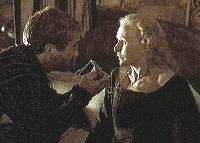Freudian Psychoanalysis in Hamlet:
One of the most interesting ways of analysing the play is through Freud’s psychoanalytic perspective, viewing the conflict of the play as a manifestation of prince Hamlet’s own unresolved oedipal complex. Applying the Oedipal theory to Hamlet, of course, assumes the influence of a universal, unconscious drive (in males) to murder their father and replace him as their mother’s sexual partner. This approach is probably popular due to its shock value, but it also does a surprisingly good job of explaining the conflict in Hamlet (both the play and the individual), as well as the roles of Claudius, Hamlet's mother, and the ghost of Hamlet's father.

The usual oedipal triangle of mother, son, and father has been altered by the addition of Claudius in Place of Hamlet's original father. No wonder Hamlet looks disturbed. (from the Branagh version)
Claudius can be explained through a psychoanalytic model in in two ways: either he is a psychological projection of Hamlet’s unconscious mind, or a real person who has coincidentally fulfilled Hamlet’s unconscious fantasies. If the first is true, then we are presumably interpreting the play a psycho-drama, replacing the man-against-man conflict with a strictly internal one. If the second is true, and we view Claudius as a real man (who happens to also be a psychological projection of Hamlet), then Hamlet is incapable of killing Claudius because he identifies too strongly with him. Either way, Hamlet’s much-debated inaction throughout the play is explained.
As a ghost, Hamlet’s father is both real and unreal by nature, so it's natural to view him as some type of symbolic projection. Unlike Claudius with his hidden, secret motivations, the ghost gives Hamlet tangible information and clear instruction for action. Thus, he/it can be understood as a manifestation of Hamlet’s conscious mind. The ghost’s command to Hamlet not to "let thy soul contrive against thy mother"(1.5.86), is an example of the socially constructed super-ego and the ego (the primary element of the conscious mind) attempting to keep the unconscious impulses of the id under control. The "Closet Scene" (3.4) reaffirms this notion of conflicting psychological forces, when the ghost returns to prevent Hamlet from enacting his oedipal fantasy with his mother.
The "Closet Scene" is probably the scene that gives the most credit to Freudian interpretations of Hamlet. Without this scene, it would seem unlikely that Shakespeare had any intentions of suggesting an oedipal relationship between Hamlet and his mother. In this scene, Hamlet directs an intense amount of negative emotion towards his mother, which is understandable given the particular situation. Instead of focusing on the obvious – Gertrude’s possible involvement in old Hamlet’s death, or at least her present marriage to his murderer – young Hamlet focuses primarily on his mother’s sexuality. Actually, early on in the scene Hamlet briefly mentions the more practical topic of his father's murder (28), but quickly shifts the focus to a comparison of the physical characteristics of his uncle and father. Hamlet then conjures up some pretty shocking imagery in showing his disgust over Gertrude and Claudius’ "incestuous" relationship: "to live in the rank sweat of an enseamed bed, stewed in corruption, honeying and making love over the nasty sty"(92-3). At the end of the scene, it seems that Hamlet’s verbal assault has been successful and the queen seems to be at the point of breaking. But when she asks Hamlet, "what shall I do?"(180), he responds not by demanding a confession but by demanding that she abstain from sexual activity with Claudius (159- 67). If we see Hamlet’s strange focus in this scene as being representative of his true motivations, then it’s possible that Shakespeare intends Hamlet’s conflict to be somewhat oedipal in nature. Shakespeare’s first wife, remember, was old enough to be his mother…

The Zeffirelli version gives us Oedipus to the Max
![]()